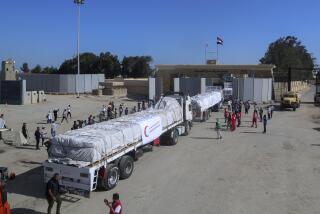Patriotism in small packages
When I first met him six years ago, Jim Hake had yet to reconcile his peacenik credentials with his fervent support for our country’s newly declared war on Iraq.
Hake had -- as you might expect from a man with a Stanford MBA -- spent months researching the subject before deciding that the U.S. invasion of Iraq was “the right thing for our country to do.”
That’s what he told me in March 2003 as we sat in the sun-dappled living room of his hillside home in Pacific Palisades and the first round of bombs rained down on Baghdad.
I could hear his intellectual conviction that war was the only way to protect our national security.
But I could also sense the emotional unease of a former yoga student who had spent years investigating human rights abuses in El Salvador and spreading technology to developing countries in Africa.
So I wasn’t surprised to see Hake’s name in news accounts about Spirit of America, a charity that straddles the line between doves and hawks, and supports military needs that have nothing to do with tanks and guns.
The project has raised more than $12 million in the last five years and sent tons of supplies -- from solar-powered radios to saffron bulbs -- to Afghanistan and Iraq.
Not bad for a nonprofit start-up that began with no business plan or financing, just a computer, Hake’s e-mail contacts and a video of Afghan kids playing baseball.
::
Hake’s light-bulb moment came during a television news story about a soldier in Afghanistan who asked his wife to solicit neighbors, family and friends for baseball gear for village kids. They raised enough to outfit a whole league.
“Nobody told this guy to do that. It was as much of a grass-roots moment as it could be,” said Hake, the founder of two successful technology firms who has been lauded by former Vice President Al Gore and Gen. Colin Powell for his technological contributions to business and education.
“I realized people here would give if they knew exactly where their money was going,” Hake said. “I thought we could use the Internet to connect the dots.”
So he met with Marines at Camp Pendleton and developed a list of items desired by troops overseas, outside of strict military needs. And he sent the wish list to everyone in his online address book.
The project grew slowly at first as donations trickled in. Then a mention in the Wall Street Journal about its campaign to equip television stations in isolated villages to broadcast local news -- and provide an alternative to the Al Jazeera network “and its focus on death and destruction by foreign intruders” -- drew a deluge of donations, Hake said.
So many that “we had more than the $100,000 we needed. We contacted the donors and offered to send their money back.” Only four of the 3,000 people who had contributed accepted the offer. The rest agreed to fund other projects.
The Spirit of America website makes it easy to donate to specific projects. And the range of requested supplies makes clear that our troops are doing more in Iraq and Afghanistan than firing guns and dropping bombs.
There are requests for sewing machines for village women and saffron bulbs for struggling farmers; for hearing aids and volleyball nets; blankets and blood-pressure cuffs.
Some donors are drawn to the practical side, by “the common sense of delivering nonmilitary items that can make our forces welcome,” said Bill Powers, an asset manager for a Newport Beach investment firm. “Better you keep a kid busy playing soccer than have him lured into carrying a backpack bomb.”
Others, like Cindy Freed- land, see giving as a way of connecting to families on the other side of the world. “It’s saying, ‘We’re just like you,’ ” she said. “I know they want to have soccer balls for their children. And toothbrushes. And school supplies. It’s not about the war at all.”
But it is about the war, and it’s as important a strategy as “community policing” is in Los Angeles. Get the natives on your side and you’ll have more success in fighting crime.
Even the smallest gifts can make a big difference in dangerous environs, Hake said, because “it’s a reason for interaction outside of a hostile encounter.
“Because you can’t just walk up to a person and have a conversation. But if you give them something -- a picture of themselves, a pair of sandals -- that makes a little bit of space . . . and maybe they can believe you want the best for them.”
::
I’m still not sure about Hake’s politics, even after our long talk. He considers himself an independent; socially liberal and fiscally conservative. But Spirit of America has no ideological cant.
John McCain is an honorary co-chairman, and “we’d welcome support from anyone,” Hake said, “whether it’s a conservative talk show host or President Obama.”
“We don’t make judgments. We just provide stuff . . . solar-powered water pumps, so farmers can irrigate their crops; soccer shoes; baseball gloves.”
He seems a little surprised by the project’s success. And he’s learned lessons he didn’t get at Dartmouth and Stanford.
“Sometimes you really have to do what you think is important to do, even though it’s not clear at all how it’s going to turn out.
“You just do what’s in front of you.” Like the troops who rumble over land mines one day and teach kids to catch donated baseballs the next.
--
You can find out more about Spirit of America at www.spiritofamerica.net
More to Read
Sign up for Essential California
The most important California stories and recommendations in your inbox every morning.
You may occasionally receive promotional content from the Los Angeles Times.










